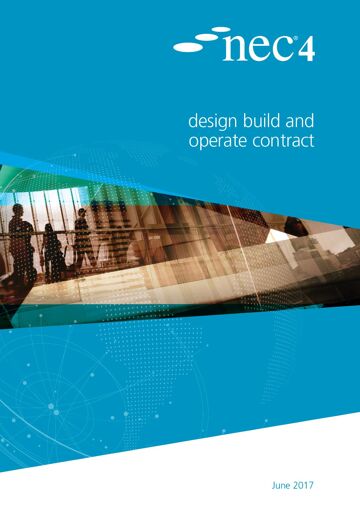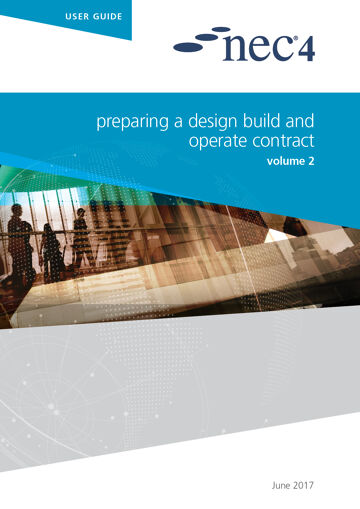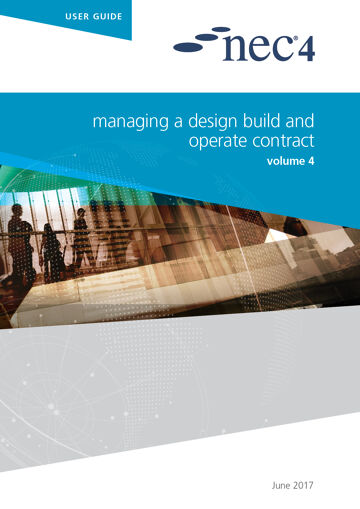NEC4 DBOC Service Manager Accreditation Extension
Delegates attending this course will gain:
- An insight into when to use the Design Build and Operate Contract (DBOC)
- How to put it together, the contract strategy
- How it is managed effectively
Upon successful completion of the programme, you will receive accreditation as an NEC4 DBOC Service Manager.
Upon successful completion, participants are eligible for inclusion on the NEC Accreditation Register. The NEC Accreditation is valid for five years and will need to be renewed to maintain accreditation status.
Background
The NEC4 Design Build and Operate Contract (DBOC) has been developed for the appointment of a Contractor to operate a Client’s asset for a period of time, and during that period has undertaken significant new build or refurbishment to support the operational requirements.
It combines and places responsibility for usually disparate functions (design, construction, operation or maintenance) with a single contractor.
People will be motivated to play their part in collaborative management if it is in their commercial and professional interest to do so. Uncertainty about what is to be done and the corresponding risks and liabilities can lead to disputes and confrontation.
The DBOC clearly allocates risks, and the collaborative approach will reduce those risks and uncertainty for all the parties.
This training programme starts at 09:00 and finishes at 17:00 with refreshment breaks mid-morning and afternoon, plus lunch. All timings, except the start time, are approximate and may be adjusted to suit natural breaks in the training programme.
Session 1: Overview of the NEC and the NEC4 Design, Build and Operate Contract (DBOC)
- This session will show how NEC contracts have helped transform industry behaviours and how DBOC works alongside other contracts in the suite.
Session 2: Using the DBOC
- This session covers the contract strategy; an explanation of the main and secondary Options that can be chosen and the other contract documents that need to be produced. It will also outline the difference between defined and identified terms, their significance in the contract and the contract data and how they should be used.
Session 3: Managing the contract - the DBOC processes
- 3.1 - General provisions. This session will look at the general techniques that are used to manage the contract including mutual trust and co-operation, communications, the role of the Service Manager and early warnings. The Scope of service and the difference between the Client’s Scope and the Contractor’s Scope. It will also outline the difference between defined and identified terms, their significance in the contract and the Contract Data and how they should be used.
- 3.2 - Contractor’s main responsibilities. This session outlines Contractor’s main responsibilities and covers how the works are defined, the Operational Requirements, the Contractor’s design and key people and subcontracting.
- 3.3 - Time. This session looks at when the works start and finish, the importance of the plan and how the Accepted Plan is used and revised to help manage delivery.
- 3.4 - Quality management. This session clarifies how defective work is identified and managed throughout the plan and after Completion.
- 3.5 - Payment. This session covers how amounts for payments are calculated and how handling costs can vary with the main Options. It includes when payments should be made as well as the Price List and the Schedule of Cost Components. The application of the Performance Table is also covered.
- 3.6 - Compensation events. This session gives an overview of what compensation events are, how they vary with the Option chosen and how they should be managed to ensure neutral cost to the Contractor and transparency and fairness to the Client.
- 3.7 - Title. This section will review how title passes between the Parties and the relevance of Service Areas.
- 3.8 - Liabilities and insurance. This session looks at the way the contract deals with liabilities and maintains a risk profile which complies with the overarching NEC principle of mutual trust.
- 3.9 - Termination and dispute resolution. This session deals with the process of termination and the reasons why the termination process can be invoked, and also with the various dispute resolution procedures.
The course is only for candidates who have undertaken either the NEC4 ECC (Project Manager) or the NEC4 TSC (Service Manager) Accreditation and who are looking for a top-up course focusing on the DBOC.
Virtual Training
Product code: L46353






